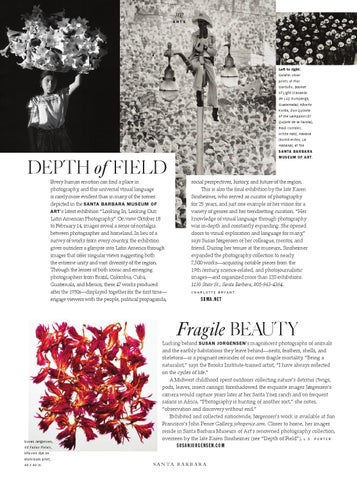102
ARTS
Left to right: Gelatin silver prints of Flor Garduño, Basket of Light (Canasta de Luz, Sumpango, Guatemala); Alberto Korda, Don Quixote of the Lamppost (El Quijote de la Farola), Raúl Corrales, White Hats, Havana (Sombreritos, La Habana), at the SANTA BARBARA
DEPTH of FIELD Every human emotion can find a place in photography, and this universal visual language is rarely more evident than in many of the scenes depicted in the SANTA BARBARA MUSEUM OF ART ’s latest exhibition “Looking In, Looking Out: Latin American Photography.” On view October 18 to February 14, images reveal a sense of nostalgia between photographer and homeland. In lieu of a survey of works from every country, the exhibition gives outsiders a glimpse into Latin America through images that offer singular views suggesting both the extreme unity and vast diversity of the region. Through the lenses of both iconic and emerging photographers from Brazil, Colombia, Cuba, Guatemala, and Mexico, these 47 works produced after the 1930s—displayed together for the first time— engage viewers with the people, political propaganda,
MUSEUM OF ART .
social perspectives, history, and future of the region. This is also the final exhibition by the late Karen Sinsheimer, who served as curator of photography for 25 years, and just one example of her vision for a variety of genres and her trendsetting curation. “Her knowledge of visual language through photography was in-depth and constantly expanding. She opened doors to visual exploration and language for many,” says Susan Jørgensen of her colleague, mentor, and friend. During her tenure at the museum, Sinsheimer expanded the photography collection to nearly 7,500 works—acquiring notable pieces from the 19th century, science-related, and photojournalistic images—and organized more than 120 exhibitions. 1130 State St., Santa Barbara, 805-963-4364. C H A R LOT T E B RYA N T
S BMA. NET
Fragile BEAUTY
Susan Jørgensen,
65 Fallen Petals,
Lurking behind SUSAN JORGENSEN ’s magnificent photographs of animals and the earthly habitations they leave behind—nests, feathers, shells, and skeletons—is a poignant reminder of our own fragile mortality. “Being a naturalist,” says the Brooks Institute-trained artist, “I have always reflected on the cycles of life.” A Midwest childhood spent outdoors collecting nature’s detritus (twigs, pods, leaves, insect casings) foreshadowed the exquisite images Jørgensen’s camera would capture years later at her Santa Ynez ranch and on frequent safaris in Africa. “Photography is hunting of another sort,” she notes, “observation and discovery without end.” Exhibited and collected nationwide, Jørgensen’s work is available at San Francisco’s John Pence Gallery, johnpence.com. Closer to home, her images reside in Santa Barbara Museum of Art’s renowned photography collection, overseen by the late Karen Sinsheimer (see “Depth of Field”). L . D . P O R T E R
S US ANJORGENS EN. COM
infusion dye on aluminum print, 40 x 40 in.
WINTER16.cultureABB_JT.indd 102
S A N TA B A R B A R A
11/11/15 4:48 PM
